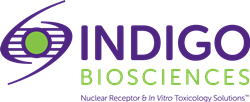[ad_1]

CB1R represents an exciting expansion for our team in both technology and our understanding of the role cannabinoid receptors play in the critical disease states in which our customers work, including oncology and neurological disorders.
STATE COLLEGE, Pa. (PRWEB)
July 13, 2021
INDIGO Biosciences, the recognized industry leader in nuclear receptor research, has expanded their robust testing portfolio to include a new Cannabinoid Type 1 Receptor (CB1R) assay, primarily used in developing cancer side effect-related treatments and implicated in the development of certain neurological disorders such as schizophrenia. This cell-based in vitro assay provides discovery researchers with the ability to quickly make critical decisions about potential drug and treatment candidates before moving into trials.
“CB1R’s addition to the INDIGO portfolio represents an exciting expansion for our team in both receptor technology and our understanding of the role the cannabinoid receptors in the critical disease states in which our customers work” says Dr. Jack Vanden Heuvel, Chief Scientific Officer of INDIGO. “We were fortunate to work with our partners at Cayman Chemical from the early stages of our research. Cayman has decades of experience developing products to study the endocannabinoid system and the INDIGO team benefited greatly from their willingness to share insight, resources, and feedback throughout the development process.”
CB1R is one of the two main cannabinoid receptors identified as part of the endocannabinoid system. CB1R is highly expressed in the central nervous system, but also in skeletal muscles, GI tract, liver, pancreas, skin, reproductive system, and cardiovascular system. The receptor is involved in a wide range of physiological processes related to neurological disorders, energy metabolism, obesity, diabetes, cardiovascular and reproductive disorders, inflammation, and cancer.
While dysfunction of CB1R binding in the brain has been shown to have potential links to schizophrenia and other neurological disorders, there is also growing evidence of the benefits of the cannabinoid receptors in the treatment of various cancers and their symptoms. Cannabinoids are often used for cancer patients to temporarily alleviate the weight loss and pain that often accompany cancer treatments. The increase in cannabinoid use for cancer treatments is partially due to the discovery of its potential utility for targeting and killing cancer cells. CB1R is shown to be primarily affected in lung and colon cancers.
In vitro assays, such as those offered by INDIGO, provide important early indications of a compound or antibody’s potential for progressing to further development and clinical testing. INDIGO’s assays allow researchers to definitively determine what receptors are affected to ensure the selectivity of target compounds, a key piece of information necessary to proceed with development. The new CB1R reporter assay is available both as a screening service or as an all-inclusive kit.
About INDIGO Biosciences, Inc.
INDIGO Biosciences, Inc. is a leading provider of nuclear receptor and in vitro toxicology solutions that accelerate scientific decision-making. INDIGO supplements the world’s largest portfolio of nuclear receptor kits and services and in vitro toxicology solutions with greater results readability, reproducibility, and faster turnaround times. Our solutions, plus supportive team and reliable science and platforms aim to reduce the time, cost, and risk associated with the discovery process.
About Cayman Chemical
Cayman Chemical Company helps make research possible by supplying scientists worldwide with biochemical tools used to understand cancer, neurochemistry, oxidative injury, endocrinology, atherosclerosis, and other human health challenges. Our scientists are experts in the synthesis, purification, and characterization of biochemicals ranging from small drug-like heterocycles to complex biolipids, fatty acids, and many others for use as research reagents and qualified standards. We are also highly skilled in all aspects of assay and antibody development, protein expression, crystallization, and structure determination. In addition, we offer a wide range of analytical services using LC-MS/MS, HPLC, GC, and many other techniques. Cayman performs generic drug development and production in both Ann Arbor, Michigan and Neratovice, Czech Republic.
Share article on social media or email:
[ad_2]

